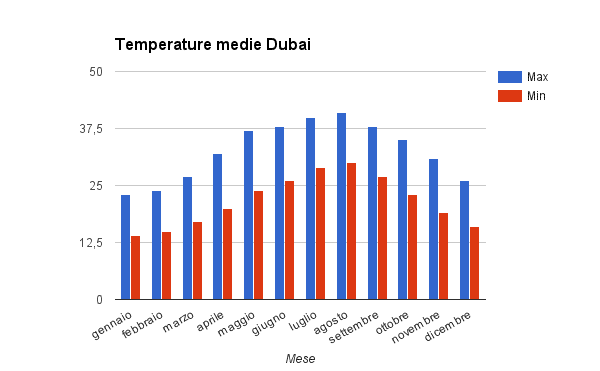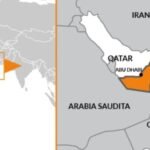Dubai has a desert climate, characterised by extremely hot summers and mild winters. During the summer months, temperatures can exceed 40°C (104°F), while in winter, average temperatures range between 14°C and 24°C (57°F and 75°F).
Rainfall is low and mainly concentrated in the winter months, making Dubai a predominantly sunny and dry destination for much of the year.
Humidity can be high, especially in the summer months, contributing to a feeling of intense heat. In summary, Dubai's climate is typically hot and dry, with high temperatures throughout the year and little rainfall.

How does the climate affect daily life in Dubai?
Dubai's hot and dry climate has a significant impact on the daily lives of inhabitants and visitors. Here are some ways in which the climate influences life in Dubai:
Architecture and Town Planning
- Buildings designed for climate: Buildings in Dubai are designed to cope with intense heat, with large glass surfaces, efficient air-conditioning systems and heat-reflecting materials.
- Covered public spaces: Many public spaces, such as shopping centres and underground stations, are covered to protect against high temperatures.
- Shaded car parks: Many car parks have covers to shade cars and reduce heat inside.
Outdoor Activities
- Preference for indoor activities: During the summer months, most activities take place indoors in air-conditioned environments, such as shopping centres, museums and cinemas.
- Flexible hours: Many companies adopt flexible working hours, starting earlier in the morning and taking longer breaks during the hottest hours of the afternoon.
- Pools and crowded beaches: During the summer, swimming pools and beaches are very popular for cooling off and enjoying leisure time.
Clothing
- Lightweight, breathable clothes: The clothing is designed to be light and breathable to cope with the heat, with materials such as cotton and linen.
- Widespread use of air conditioningAir conditioning is omnipresent in all buildings, vehicles and public spaces to combat the heat.
Health and Safety
- Important hydrationDrinking plenty of water is essential to stay hydrated and prevent heat stroke.
- Precautions for children and the elderly: Children and the elderly are more vulnerable to the heat and require more precautions, such as avoiding direct exposure to the sun during the hottest hours.
- Fire hazards: Dry heat increases the risk of fire, requiring greater precautions and efficient fire-fighting systems.
In short, Dubai's hot and dry climate profoundly influences the architecture, daily activities, clothing and health of its inhabitants, requiring specific adaptations and precautions to cope with the challenges posed by high temperatures.


